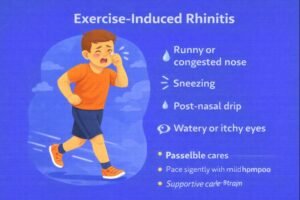Exercise-Induced Rhinitis: First Aid Awareness for Athletes and Active Canadians
What Is Exercise-Induced Rhinitis?
Exercise-induced rhinitis refers to temporary nasal irritation that appears during or after physical activity. It commonly involves a runny or congested nose, sneezing, watery or itchy eyes, and post-nasal drip. Unlike a cold, symptoms are often linked to movement, breathing rate, and environmental exposure rather than infection. Both people with allergies and those without known sensitivities can notice these effects.
Why Rhinitis Awareness Matters in Canadian Workplaces and Sports Settings
In Canada, many people exercise outdoors in changing weather or participate in indoor fitness programs, team sports, and physically demanding jobs. First aid awareness focuses on recognizing discomfort early, supporting breathing comfort, and adjusting activity or environment rather than diagnosing illness. Early awareness can help maintain performance and comfort without unnecessary strain.
A Simple, Realistic Scenario
During a winter jog, a recreational runner begins to experience a persistent runny nose and watery eyes despite feeling otherwise well. Remembering basic first aid awareness, they slow their pace, move to a less windy route, and take short breaks to clear nasal passages before continuing.
Common Signs and Symptoms
Exercise-induced rhinitis can vary in intensity but often includes:
-
Runny or congested nose
-
Sneezing during or shortly after activity
-
Itchy or watery eyes
-
Post-nasal drip or throat clearing
-
Mild facial pressure or nasal irritation
Symptoms usually ease with rest or environmental changes.
Who May Be Affected?
-
Individuals with seasonal or environmental allergies
-
People without known allergies who exercise in cold, dry, or polluted air
-
Athletes training outdoors in wind, dust, or pollen seasons
-
Indoor exercisers exposed to strong odours, cleaning products, or dry air
Highly sensitive individuals may notice stronger reactions, but anyone can experience temporary nasal irritation during exertion.
Possible Contributing Factors
While exact mechanisms can vary, common contributors include:
-
Temperature and humidity changes (very cold or dry air)
-
Airborne irritants such as dust, smoke, or strong scents
-
Rapid breathing rates during intense exercise
-
Environmental transitions (indoor to outdoor workouts)
-
Heightened sensitivity of nasal blood vessels and tissues
These factors can increase blood flow and sensitivity in the nasal lining, leading to congestion or dripping.
First Aid Awareness and General Comfort Measures

-
Warm up gradually before intense activity
-
Choose routes or spaces with cleaner air when possible
-
Use a scarf or face covering in very cold, dry weather
-
Take short breaks to slow breathing and clear nasal passages
-
Stay hydrated to support overall comfort
-
Monitor patterns and note triggers (weather, locations, scents)
First aid awareness emphasizes observation and simple adjustments rather than medical treatment.
Prevention and Activity Considerations in Canada
-
Check pollen or air-quality forecasts before outdoor workouts
-
Ventilate indoor exercise spaces and avoid strong fragrances
-
Layer clothing to adapt to temperature shifts
-
Pace intensity increases rather than sudden spikes
-
Coordinate activity timing to avoid peak irritant conditions when feasible
These habits can help reduce frequency and severity of symptoms for both recreational and competitive athletes.
Frequently Asked Questions About Exercise-Induced Rhinitis
Is this the same as having a cold?
No. Symptoms are usually tied to activity and environment rather than infection.
Can it happen indoors too?
Yes. Dry air, dust, or strong cleaning scents can trigger similar irritation.
Why does cold air make symptoms worse?
Cold, dry air can increase nasal sensitivity and fluid production.
Does hydration matter?
Adequate fluids support overall comfort and may reduce throat dryness.
When should symptoms be checked further?
If nasal irritation is persistent, worsening, or accompanied by unusual breathing difficulty or ongoing fatigue, further assessment is advisable.
Educational Note
This article is intended for general public and workplace education in Canada. It supports awareness of exercise-related nasal irritation and first aid recognition but does not replace evaluation or care from qualified healthcare professionals.
